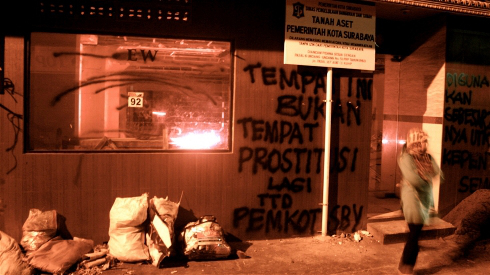Surabaya, 30 October 2014 (IRIN)* – Brothel closures in Indonesian cities could put sex workers in danger and hamper HIV prevention efforts, say health experts and outreach workers.
In 2013 Surabaya’s firebrand mayor closed two of the city’s six red light districts, and in June 2014 she shut down Dolly, one of the largest sex work complexes in Southeast Asia. But while she is running the campaign in the name of public morality, research shows closing brothels puts sex workers at increased risk, and HIV interventions must adjust.
“The government has a history of working closely with the pimps and hotel owners to make sure the sex workers were at least safe,” she said, explaining that brothels were typically quite control-oriented, with management only allowing their female sex worker employees limited amounts of freedom.
“It was an acknowledgement of the patriarchal culture that ran the place, but it was pragmatic,” she said.
Mbak Ida told IRIN she had met street-based sex workers whom the police had locked inside rehabilitation centres and tortured for months. “There’s a reason women prefer the brothels,” she explained. “They know that the brothel owners have an incentive to keep them safe, and feeling well,” she said.
“Once a month the health department would come do HIV tests,” said Susi. “The pimps and brothel owners said we had to do it or they would kick us out, so we would do it, we didn’t have to plan for it because we knew it was coming.”
Or, as the 2014 health study explained: “Brothel-based female sex workers in Surabaya have been the targets of sexually transmitted infection control and condom use promotion efforts for more than 3 decades.”
More risks for sex workers?
Putin, who uses just one name, a member of the Forum Komunikasi Masyarakat Lokalisas Surabaya, an organization representing brothel owners and employees, told IRIN that since Surabaya’s brothel closures began, everyone associated with the industry is desperate to maintain income.
“Now, because the professional sex workers are gone, sometimes hotel owners just ask random women on the streets if they want to have sex a few times to make money,” he said. “Some of them say yes, but this is a very different type of person – she is not a professional. It’s not clear she knows much about sexual health at all because the brothels are where such things were taught and enforced.”
It is that termination of health “enforcement” that has others worried.
A 2013 review of the US Agency for International Development’s HIV work in Indonesia, published as red light districts were being squeezed, warned that “brothel closures can rapidly decrease the size of the population that can be reached.” The report said: “Staff at the district health office [in Surabaya] noted that they have no plan for providing HIV prevention services to female sex workers who will be affected by brothel closures.”
Enforced HIV testing counterproductive?
But the shift to the less-secure streets is not the only problem. The way brothels manage sex workers’ health, others say, may create more risk in the long run.
Indonesia’s 2010-2014 National HIV and AIDS Strategy and Action Plan promotes “100 percent condom use”. Dubbed “100% CUP”, the strategy involves registering and monitoring brothel-based sex workers.
The approach has been popular among brothel owners and local governments in Indonesia, and data suggest some impact.
According to 2011 Integrated Bio-Behavioral Survey (IBBS) data, 47 percent of “direct” female sex workers (or DFSW – those who earn money only from sex work, often brothel-based) report they always use condoms, compared to only 35 percent of “indirect” female sex workers (IFSW – those for whom sex work is not the primary source of income, and who very rarely appear in brothels).
The report also showed that only 25 percent of IFSW had ever made contact with an HIV outreach worker, whereas more than half of DFSW had.
“100% CUP” has been repeatedlycriticized, however, for leading to forced HIV tests. UNDP, UNAIDS and UNFPA argued that, “condom programmes that rely on enforcement of mandatory measures by health authorities, police or managers of sex work businesses can be counterproductive to HIV responses.”
“We have only been able to create a real difference for the sex workers in the red light districts because that’s where we have been funded to focus,” laments Mbak Ida. “That’s where the plans and interventions have targeted.”
“We need to find ways in Indonesia to make health services available, accessible and acceptable to sex workers based on the principles of non-discrimination and the right to health,” UNAIDS-Indonesia country director Cho Kah Sin told IRIN, echoing UN World Health Organization (WHO) standards that universal access to condoms is more effective than regulatory measures such as coerced testing of sex workers. [This report does not necessarily reflect the views of the United Nations].
Read also:
Commercial Sexual Exploitation Generates US$ 99 Billion… a Year!
Who Dares to Challenge a 32 Billion Dollars Business – Human Trafficking?
Over 100 Million Children Subjected to Slavery, Sexual Exploitation
Sex, Drugs &… Hookers, Dope Bring Italy out of Recession
“Haitian Women, Girls Trading Sex to Survive”
Millions of Urban Children at High Risk of Violence, Exploitation and Trafficking
2.4 Million Victims of Human Trafficking At Any Given Time Across the Globe
2014 Human Wrongs Watch







